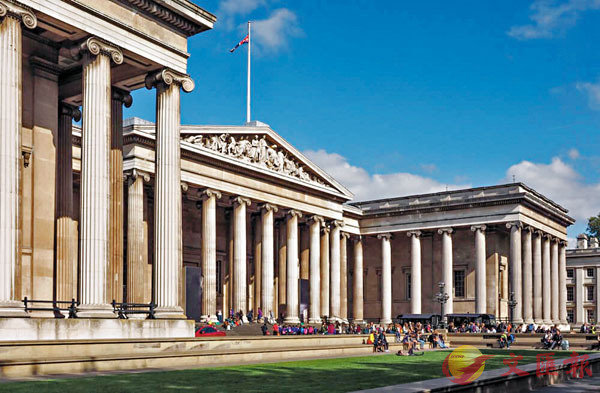 ■大英博物館
■大英博物館【原文】下文摘錄自香港《文匯報》11月6日報道:
英國大英博物館收藏無數珍貴文物(cultural relic),但不少其實是在對外殖民時期(colonial period),從外國掠奪得來。英國御用大律師羅伯遜(Geoffrey Robertson QC)在昨日推出的一本新書撰文,批評大英博物館是「全球最大的接贓者」,滿手鮮血,促請英國以至其他歐美國家,向各國歸還掠奪得來的文物。
羅伯遜批評歐美當年征服(conquest)世界期間,軍人和殖民地官員於各地掠去(loot)文物,如今大英博物館只是展出「偷來的文化遺產」。
羅伯遜指出,大英博物館容許非官方的「贓物之旅」,帶領遊客參觀希臘(Greece)巴特農神殿浮雕(Parthenon Marbles,又稱「額爾金大理石」Elgin Marbles),復活節島(Easter Island)的摩艾石像(Hoa Hakananai'a),以至尼日利亞(Nigeria)的貝寧青銅器(Benin Bronzes)等被盜文物,更收藏無數尚未公開展出的掠奪品。大英博物館發言人(spokesperson)已證實,館方允許外部導遊組織「贓物之旅」。
大英博物館曾為館藏來源辯護,例如引述英國國會(British Parliament)1816年的調查結果,宣稱巴特農神殿浮雕是額爾金伯爵(Lord Elgin)在19世紀時,獲鄂圖曼帝國(Ottoman Empire)批准下,從雅典(Athens)運到倫敦(London)。羅伯遜批評這說法是精心編造的謊言,形容無論是大英博物館,還是法國的羅浮宮(Louvre)、美國的大都會博物館(Metropolitan Museum of Art),均只是囚禁來自其他地方的文化遺產,「都是從侵略和欺騙中偷來的。」
法國總統馬克龍(Emmanuel Macron)去年宣佈,向非洲國家歸還部分文物,羅伯遜呼籲英國跟隨,以人權(human right)法則歸還文化財產,不應再推卸責任。
羅伯遜形容,無論政客對帝國時期的行為作多少道歉,唯一補償方法是向埃及(Egypt)、中國,還有其他非洲、亞洲和南美國家歸還文物,「我們無法修正歷史錯誤,但也不能再不知羞恥地以它們牟利。」
不過羅伯遜承認,即使英國願意歸還巴特農神殿浮雕等最具代表性的(representative)文物,也不代表其他海外文物可獲得同等待遇,原因是並非所有文物均具有同等知名度或重要性,而且英國當年掠奪這些文物的過程,更可能涉及英方未必願意承認的戰爭罪行(war crime)。
大英博物館承認一些藏品牽涉「艱難歷史」,去年已派員到尼日利亞貝寧城(Benin City),計劃歸還貝寧青銅器,但至今未有下文。
British Museum is world's largest receiver of stolen property, says British lawyer
【譯文】The British Museum has a collection of numerous precious cultural relics, of which many of them were actually stolen from foreign countries during colonial periods. Geoffrey Robertson QC in his new book criticized the museum for becoming "the world's largest receiver of stolen property" with "hands of the blood". He urged British and other European and US institutions to return the treasures to the respective countries.
He blamed the military and colonial officials of the European and American nations for looting different cultural properties everywhere during their conquest of the world, and the British Museum nowadays is just exhibiting "pilfered cultural property".
It was discovered that the museum allows an unofficial "stolen goods tour" which stops at the Parthenon Marbles (also known as the Elgin Marbles) of Greece, the Hoa Hakananai'a of the Easter Island, the Benin Bronzes of Nigeria and other pilfered cultural properties, and a great majority of the loot is not even on public display. A spokesperson of the museum admitted that it allows a "stolen goods tour" run by an external guide.
The British Museum defended the acquisition of the collections by citing the results of the British Parliament's investigation in 1816, claiming that the Parthenon Marbles were transported from Athens to London by Lord Elgin in the 19th century, with the approval of the Ottoman authorities of the day. Robertson described these as "carefully-constructed lies", saying that the British Museum, the French Louvre and the U.S. Metropolitan Museum of Art simply locked up the precious legacy of other places "stolen by wars of aggression and duplicity".
The French President Emmanuel Macron declared last year the restitution of cultural property to African countries, and Robertson advised Britain to follow suit based on human rights law principles and not to shirk its responsibility. He said that regardless of the apologies made by politicians for the crimes of their former empires, the only way to compensate is to return the cultural heritage back to Egypt, China, and other African, Asian, and South American countries. "We cannot right historical wrongs - but we can no longer, without shame, profit from them."
Yet, Robertson admitted that even if Britain is willing to return some of the most representative ancient treasures such as the Parthenon Marbles, other overseas cultural heritages might not necessarily be treated the same, owing to the fact that not all of them are equally well-known or important, and the ways of acquisition will inevitably involve war crimes that the British authorities do not want to admit. The British Museum acknowledged the "difficult histories" of some of its collections, and visited Benin City last year planning to return the Benin Bronzes, but not much progress has been made so far.■龐嘉儀
Q&A
1. 大英博物館於何年成立?
2. 該館的成立源自於哪位著名收藏家?
3. 該館擁有約多少件藏品?
4. 哪件展品被譽為該館的鎮館之寶?
Answer
1. 1753年
2. 漢斯.斯隆(Hans Sloane)
3. 800多萬件
4. 羅塞塔石碑(Rosetta Stone)

